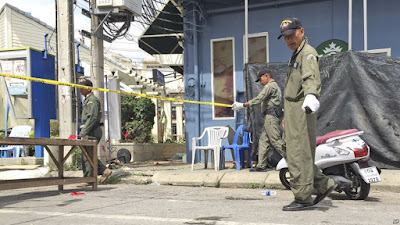
อาชีพที่รุ่งเรือง ในยามเศรษฐกิจตกต่ำ ยุคเผด็จการทหารไทย

Narin Sanguansap
ooo
อ้าว! นึกว่าปีแพะ
https://www.facebook.com/Nattawut.UDD/videos/1215842808473324/
ooo
Thailand Avoids Linking Bloody Insurgency to Tourist Site Blasts

Investigators work at the scene of an explosion in the resort town of Hua Hin, 240 kilometers (150 miles) south of Bangkok, Aug. 12, 2016.
Source: Voice of America
BANGKOK —
Within hours of last week's deadly bomb and arson attacks in Thailand, police and senior officials publicly ruled out any link to foreign militants and insisted the perpetrators, as yet unidentified, were homegrown.
But they also doubted the involvement of Thailand's most violent homegrown militants: the Malay-Muslim insurgents fighting a bloody separatist war in the country's three southernmost provinces, where similar bombings are grimly routine.
The official denial was unsurprising, said security experts.
Admitting that southern insurgents could be involved in last week's attacks would have serious economic and security implications for Thailand.
No group has yet claimed responsibility for the wave of bombings on Thursday and Friday that killed four people and wounded dozens, including foreign tourists.
But some security experts have noted that southern insurgent groups have a track record for carrying out coordinated bombing attacks.
Since 2004, a low-intensity but brutal war between government troops and insurgents has killed more than 6,500 people in the southern provinces of Yala, Pattani and Narathiwat that border Malaysia.
Most people there are ethnic Malay Muslims, who for decades have chafed under the rule of Buddhist-dominated governments in faraway Bangkok.
Last week's attacks had "nothing to do with the southern insurgency," Colonel Yuthanam Phetmuang, a spokesman for the military's Internal Security Operations Command (ISOC) told Reuters.
Yuthanam denied the police were too quick to reach this conclusion, insisting it was based on "evidence collected and experience". He declined to elaborate further.
Political motivations
Deputy Prime Minister Prawit Wongsuwan, also Thailand's defense minister, told reporters on Monday the attacks were "definitely not an extension" of the southern insurgency, but said the perpetrators "could have been hired from there."
Security experts told Reuters that southern insurgents should remain the chief suspects, and questioned the government's political motivations for so hastily ruling them out.
Admitting the possible involvement of insurgents would mean that violence, once largely contained in the south, was "spreading to other parts of the country," said Rungrawee Chalermsripinyorat, an independent analyst who has written two books on the conflict.
"This could have a potentially huge economic impact," she said.
If perpetrated by the insurgents, the attacks constituted the biggest and deadliest campaign yet outside their traditional area of operations, she said.
It could also indicate that security operations in the south had "seriously failed," despite the military taking complete control after seizing power in a 2014 coup, she added.
Rungrawee stressed that the involvement of southern militants in the recent attacks "remains a hypothesis."
New constitution
The attacks came days after Thailand voted to accept a new constitution that paves the way for an election in 2017 and, say critics, enshrines the military's already considerable power.
Thailand's deputy national police chief on Sunday said the attacks were carried out simultaneously by one group on the orders of one person, but gave no further details.
Police on Monday said they had arrested one man for arson.
Suspicion over the attacks has also fallen on forces loyal to former populist Prime Minister Thaksin Shinawatra who was toppled in a 2006 coup. His sister, Yingluck, who took power after a winning a general election in 2011, was ousted in a 2014 coup.
His "red shirt" supporters denied they were behind the attacks. Security experts have said the involvement of the group, which is intensely monitored by the military, is highly unlikely.
Most Thais voters accepted the military's constitution, but those in the three southern provinces overwhelmingly rejected it.
Analyst Rungrawee said this reflected deep local resentment of the Thai military and government.
Tourists targeted before
Violent incidents, including roadside bombings and shootings, take place almost daily in the southern border provinces. But they have spiked considerably so far this month, with 88 incidents of violence just in the first 10 days of August in the three southern provinces and neighboring Songkhla province, according to Deep South Watch (DSW), a Pattani-based group which monitors the conflict.
This compared with 32 incidents in all of August 2015, the lowest level of violence for 12 years.
Southern insurgents have targeted tourist sites before.
Thirteen people were killed and more than 300 wounded in March 2012 when multiple bombs went off in Yala and Hat Yai, a bustling commercial center north of the three southern provinces popular with Malaysian visitors.
Peace talks between the Thai government and a handful of insurgent groups began in 2013 under the civilian government of Prime Minister Yingluck Shinawatra, but have stalled since the military overthrew her.



.jpg)



